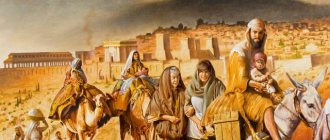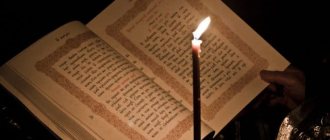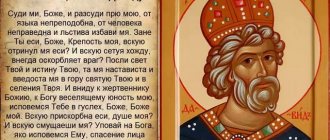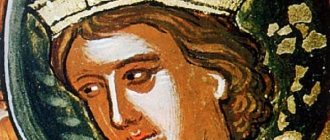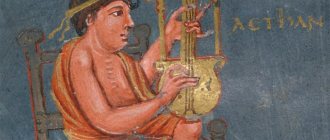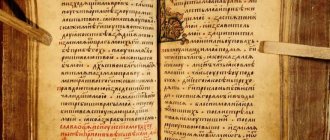Text of prayer Psalm 54
Traditionally, the prayer is read in Church Slavonic in the church during the service. But the original is difficult to understand. It will not immediately become clear to an inexperienced person how to read a certain word, where to put the emphasis and what the word means. Before mastering the Church Slavonic version, you should turn to the Russian translation. Such a prayer gives the believer more understanding of the main events, and the text will take on meaning, uniting the sincere Christian and the Lord.
In Church Slavonic with accents
In Russian
Same Psalm
Look upon us, O all-merciful Lady, and have mercy on us who love Your holy name; With all our hearts we cry out and pray to You, Lady, direct our feet on the path of salvation and may all lawlessness not rule our will. Hear, heavens, and teach, to earth: just as a baby cannot live without a nurse, so without our Lady, the Ever-Virgin Mary, we cannot receive eternal salvation. There is peace for many who love, honor and worship the Queen of Heaven, for under Her protection those who remain will be far from eternal destruction.
The princes of hell, having bypassed us, have been everywhere, the nets of malice in heaven are everywhere to ensnare our hearts and souls, but from invoking Your holy name, O beloved Mother of God, the machinations of the enemies disappear like smoke. The world is full of those who love Your name and there is no temptation for them; our soul will live and praise You, its most merciful Lady; Your mercies will always help us; We sing the praises of the Lord to You seven days a week and will not leave calling on You, our helper, in all the days of our life, for through this we will not get lost, like a lost sheep, because Your ways are heavenly light and truth.
Song instead of glory
Rejoice, blessed Ever-Virgin Mary; who can adequately thank and praise you? The heavens are filled with Thy glory and the earth is filled with Thy mercy; by Thy seedless Nativity, Thou hast freed our souls from the ashes of eternal death and placed them in the paradise of immortality.
According to the 17th kathisma troparia, ch. 1
The multitude of Christians rejoice in Thy name, O Mother of God, who call upon Thy heights every day and magnify Thy heights with love. You are the praise and helper and unashamed intercessor of all who honor Thee with faith.
Rejoice at the earthly Mother of the Lord, praise the heavenly Powers, glorify those who reign on earth, come, all of you, rejoice with the words of the Mother of God in accordance with your faith, rejoicing
The new heaven, containing the inexpressibly existing in the heavens, the incontainable Word, the animated chamber of the Lord of creation, the glorious and most famous city of our Savior: make me a citizen of the heavenly fatherland
Prayer
Most Holy Lady, Lady Theotokos! We resort to You, Pure One: For You are an insurmountable wall, intercession and protection for all who come running to You with faith and hope! We pray to Thee, Most Blessed One, hear the prayer of Thy unworthy servants and ever stand for Thy servants who have fallen asleep. You will intercede for those who Orthodoxy revere Thee, who resort to Thy protection and the warmth of those who pray to Thee in illness, sorrow and adversity; but Your intercession, Your intercession is most beneficial to us after our death; You show Your immediate help to Your servant and do not cease to show Your mercy to all who pray to You and pour out the great and rich mercies of Your Son and our God on all believers: in You, the only one in God, imams have firm hope and trust: no one, praying to You, departs from You are without help, joy, consolation, and pleasure. We pray to You, O Most Holy Theotokos, Lady of the world, who have unreliable hopes, be today an intercessor to Him who was born of You for Your departed servants, beg Your Son and our God to grant them forgiveness and remission of sins. Pray, Mother of God, much more can a motherly prayer do for the mercy of the Lord; For from You the Lord accepts every word of petition; therefore You also accept our prayers and supplications offered to You, Most Holy Virgin, from all our hearts and all our souls for the souls of Your departed servants. We pray to You, help them. Mistress, by your motherhood to the Lord, boldly reach a quiet refuge in heavenly Jerusalem; help them, O zealous Intercessor, to appear shamelessly at the terrible and second coming of Your Son, where each one will either be glorified or ashamed by his deeds; help them, O Most Gracious One, to be justified before the face of Him who sits on the throne of glory, so that they will not be ashamed before the Angels and all the Saints, before the whole world, above and below. Oh, All-Singing Mother, Lady Theotokos, we pray to You, intercede, save, preserve and eradicate the future torments of Your departed servants, may they not perish forever, but may they be saved by Your prayers and pass from death to the belly. We, sinners and unworthy servants of Yours, will not retreat from You, we will not stop crying out to You in tenderness: Most Holy Lady, Queen and Lady! pray to Thy Son and our God for Thy departed servants, that the Lord may grant them remission of sins; send them, O Blessed One, to reach the longed-for fatherland and see the blessings of heaven, which no eye has seen, no ear has heard, and no one has sighed in the heart; pray for them, Mother of God, that through Your intercession they may be worthy to partake of these blessings in the Kingdom of Your Son, Christ our God. For You are the only blessed and powerful Intercessor among women, hope, protection and refuge for all who flow to You - You are the bridge , lead those who are from earth to heaven and the opening of the doors of heaven. Amen.
We advise you to study the Icon of the Prayer of Detention
History of writing
For many researchers, it becomes obvious that Psalm 54 was written at a time when his son Absalom rebelled against the king. The ruler’s closest friend and ally, Ahithophel, supported the treacherous son. Some interpreters have the theory that Psalm 54 is prophetic, since the suffering of David is projected into the future, namely the suffering of Jesus Christ. Ahithophel is a prototype of Judas, who also committed treason and then hanged himself. Moreover, from a historical point of view, the events of the chant coincide with the real life events of David. At this turning point, when Jerusalem was gripped by unrest and panic, the king prepared for his escape.
Interpretation
- Verse 1. A traditional verse that glorifies the Lord. The author reminds us that we need to believe in him. Life in godlessness is punishable by severe punishments that He brings down on people.
- Verse 2. The author believes that dark demons can be driven away by singing a song of victory. He encourages the Israelis to perform this ritual, which will help them get rid of demonic power over the mind and soul.
- Verse 3. The role of song and musical instrument is defined. The author compares the psalm with the teachings of the Lord, and the musical instrument (tympanum) with a weapon against sin.
- Verse 4. The passage describes when the Israelites came out of Egypt. Then their spiritual strength was at its best, and they were grateful to the Lord for His forgiveness. Over time, feelings cooled down, but they could be rekindled by the sensitive and ardent prayer of a believer. Prayer is the desire for renewal, the abandonment of the old in favor of the new. The demons, having heard the prayer, move away, leaving the souls of believers pure before God.
- Verse 6. The author refers the reader to the moment when the Jews left Egypt and heard an unknown speech. The psalmist makes assumptions: was this not the Voice of God?
- Verse 7. God could not bear to see his people suffer, and when he was convinced that they realized their sin, he brought them out of captivity to the Pharaohs.
- Verse 8. Numerous miracles are mentioned that the Almighty will perform for God’s chosen people. Verse 9. True happiness is possible only in obedience. There is no other way for the Israelites to find peace and prosperity unless they trust in the Lord.
- Verse 10. There is a reference to the Commandments of God, which Moses brought from the mountain. The author suggests remembering what was written on the tablets.
- Verse 11. If a person’s faith is strong and untarnished, then the Lord will grant him joy of life and prosperity. Such a fate awaits everyone who opens their heart to the Lord.
- Verses 12-13. God's trials are not a whim for Him. It is unpleasant for him to do this, but this method is more suitable for people who, in their atheism, have begun to forget the true faith.
- Verses 14-17. Here the author explains the position of the Creator before his people. For the good of the Israelites, the Lord created Laws, life according to which would not darken their existence. But people rejected His gift and began to live a life that was not pleasing to God. God never turned away from the Jews, but they turned away first.
This saddened Him, and He sent down trials in the hope that the souls of people would remember Him and His help. The power of the Creator is great; he is able to create happiness out of nothing. The only thing he requires is faith in His strength.
Why read Psalm 54?
Tradition prescribes reading Psalm 54 at the morning service in church in Church Slavonic. You are allowed to read a prayer at home in Russian, but always in front of the icon. Close your eyes and open your heart. Only then will the Lord be able to help you.
54:1 To the head of the choir. On stringed [instruments]. David's teaching.If misfortune has befallen you or you have been slandered by someone close to you, read Psalm 54. Remember that you need to read it only in cases where you are truly overcome by despondency or sorrow. Be sure that God is on your side and then the Almighty will come into your life to change everything for the better.
And again David's teaching in the form of a song. Here he shows that it is normal for all the servants of God to experience despair and fear when getting into difficulties, for they are human and the fear of death is normal. It’s more likely that it’s not normal to not value your life and risk it unnecessarily and for trifles.
54:2-4 Hear, O God, my prayer and do not hide from my prayer; 3 Heed me and hear me; I groan in my grief and am troubled 4 by the voice of the enemy, by the oppression of the wicked, for they bring iniquity against me and in anger they fight against me.
It is also normal, during times of difficulty, not to pretend to be a brave and imperturbable hero before God, but to sincerely pour out all our feelings to Him, even if they show our confusion in the face of troubles: grief, anxiety, uncertainty, and fear - all this does not in the least humiliate us before God and does not make us weak, because He knows that such experiences are just typical for people made of “clay,” especially since they do not arise out of nowhere, but because of unjust oppression from ill-wishers.
54:5,6 My heart trembles within me, and mortal terrors have attacked me; 6 Fear and trembling came upon me, and horror seized me.
David, trusting in God, nevertheless, was very worried about what was happening, the horror of waiting for the unknown shackled him with mortal fear, and David taught that this could happen to anyone, but there is no need to be afraid of these sensations - they are completely natural for a person in difficulties and They don’t say anything about a loss of trust in God or that God has turned away from the fearful and therefore does not give courage.
54:7-9 And I said: “Who would give me wings like a dove? I would fly away and calm down; 8 I would have gone far away and remained in the wilderness; 9 I would hasten to hide from the whirlwind, from the storm.”
In such moments of despair, you want to find yourself far, far away from everyone, in a secluded and deserted place, in order to at least take a little break from the anticipation of disasters. David dreamed of becoming a dove and flying into the desert, where no one and nothing could reach him.
54:10 Disrupt, O Lord, and divide their tongues, for I see violence and strife in the city;
But the saddest thing about David’s sorrows was that it was not the pagans or strangers to God who attacked David and oppressed him, but the inhabitants of Jehovah’s capital, Jerusalem, could not understand themselves. Violence and strife consumed this city, which should have represented the rule of Jehovah, but in fact it disgraced His name with its sinfulness and malice. Therefore, David asked “to separate their tongues” - in the same sense as the tongues of those building Babylon were divided, so that they would cease to understand each other and could no longer agree to commit evil.
54:11,12 day and night they walk around its walls; evil deeds and disaster are in the midst of it; 12 in the midst of its destruction; deceit and deceit do not leave its streets:
Neither day nor night there was no peace for the city of Jerusalem from the atrocities of its inhabitants - this is what Jehovah’s people, or rather its government, had come to, which did not cope with evil, but encouraged its proliferation. Both on its outer walls, and inside, in the middle of the city on its streets, neither deceit nor deception was stopped, but flourished. Both outside and inside this city became indecent in order to glorify Jehovah.
54:13 for it is not the enemy who reviles me, but I would bear it; It is not my hater who magnifies himself over me - I would hide from him;
David suffered greatly from the fact that it was not his enemies who were attacking him - this can be dealt with. Besides, the hostile attitude from the enemy is at least understandable.
54:14,15 but you, who were the same to me as I, my friend and my close one, 15 with whom we shared sincere conversations and went together to the house of God.
But David lamented the fact that his own people - those who not so long ago had been his friends and shared friendly conversations with him and serving God in His temple - were now taking up arms against him, as if he were a sworn wicked man. When friends become enemies, and if you don’t have a hand in it and do nothing to cause a quarrel, it’s very difficult to survive, and resentment sometimes drowns out common sense.
54:16 May death come upon them; May they go down alive into hell, for wickedness is in their dwellings, in the midst of them.
Hence David’s request for them to descend alive into the grave instead of wishing for them to have their minds enlightened and turn away from evil deeds, as God wishes his people to do in such cases.
54:17-19 I will cry to God, and the Lord will save me. 18 Evening and morning and at noon I will pray and cry, and He will hear my voice, 19 He will deliver my soul in peace from those who rise up against me, for I have many of them;
David himself planned to appeal to God for help, for David had many enemies in this city who wanted him to die. And why? Just because God loved David and rejected Saul. Envy and reluctance to admit defeat before God prompted Saul and his minions to increase evil instead of repenting and turning to God with pleas for forgiveness. God is merciful and will hear the brokenhearted. He will reject the one who persists in evil forever.
54:20 God will hear and He who lives from eternity will humble them, because there is no change in them; they don't fear God
Only God can stop their atrocities with His judgment: if there is no change for the better in them and if they do not fear God, He will not spare them.
54:21,22 They stretched out their hands against those who were at peace with them, breaking their covenant; 22 Their mouth is softer than butter, but in their heart is enmity; their words are gentler than oil, but they are drawn swords.
Such false friends, as a rule, do not openly attack: with their lips they flatter and do not at all betray their hidden hostility in order to lull the vigilance of the next intended “victim” and not give her the opportunity to defend herself. They strike from behind, unexpectedly, but before doing this, they create the appearance of peaceful and friendly relations, anointing them with an unctuous and gentle voice. So not every unctuous word is a sign of friendship.
On the contrary, the softer and sweeter the lips of the speaker, the more likely it is that they are exuding honey for a reason: they are preparing some kind of destruction or dirty trick, as for example: the lips of another man’s wife exude honey, and her speech is softer than oil; but the consequences from it are bitter, like wormwood, sharp, like a two-edged sword; Proverbs 5:3,4 Therefore, we must always be vigilant and not relax, and not buy into the unctuous and flattering words of anyone.
54:23 Cast your worries on the Lord, and He will support you. He will never allow the righteous to be shaken.
Placing all worries on the Lord, similar to the worries according to the teachings of David from this psalm, precisely means maintaining prudence and sanity, without “flowing” relaxed and formless, like a jellyfish in the sun - just from sugary speeches, and you should ALWAYS be in good shape and maintain a form of combat readiness, for God does not protect with His wings, but with what He gives knowledge and intelligence.
They, basically, protect both from the traps of enemies and from the “terrarium of friends”: Pr. 2:6: For the Lord gives wisdom; from His mouth - knowledge and understanding; 10 When wisdom has entered into your heart, and knowledge has been pleasing to your soul, 11 then prudence will guard you, understanding will guard you, 12 to save you from the way of evil
54:24 You, O God, will bring them down into the pit of destruction; the bloodthirsty and treacherous will not live to see half their days. And I trust in You, [Lord].
David does not plan to personally deal with his “friends” and punish them for their betrayal, but he is confident that God himself will deal with them in due time. It is impossible to imagine that God would allow insidious people who thirst for blood and thus indulge their ambitions into His future world order. This simply cannot happen with God. And the fact that David says about them “they will not live to see half their days” does not mean that every insidious and bloodthirsty person at 35-40 years old will certainly perish in this century, but it means that in the world order of God, none of this category of persons will not live forever. Even if they are lucky enough to get into the Millennium and God gives them another chance to become better, but if they do not change for the better, they will not last long in the period of God’s fair judgment, for THERE all sinners will die a second death forever, as it is written about this : There will no longer be a child or an old man who will not reach the fullness of his days; For a man who is a hundred years old will die a youth, but a sinner who is a hundred years old will be cursed - Isa.65:20
Interpretation of Psalm 54
When the future prophet was in the process of creating a psalm, his soul was in a state of extreme tension. The state is conveyed through each line of text.
If we analyze Psalm 54 verse by verse, we get the following:
- Verse 2-6. Great confusion overcame David and he asked the Lord for help. Those whom he considered friends yesterday became enemies. David is afraid, but his heart continues to be faithful to Him.
- Verse 7-9. The feeling of danger is growing. The king is ready to take off into the desert, like a dove, just to escape from danger.
- Verse 10-12. David is outraged that his enemies are acting arbitrarily. His speeches express direct protest against them, since by their actions they violate the laws of Moses.
- Verse 13-16. In his prayers, the ruler pours out all his pain. These verses are dedicated to his closest friend who betrayed him. It’s hard to believe and the pain is becoming more and more unbearable.
- Verse 17-20. David does not lose faith in God, although it seems that the Almighty does not hear his prayers. The ruler is confident that perseverance will lead him to dialogue with the Lord and will help him survive the adversity that befell him. The prophet anticipates success in advance, hoping for the best outcome of events.
- Verse 21-24. Here the fugitive hopes for a fair heavenly court. He denounces his enemies as treacherous and vile traitors. They turned away from God and lost their piety. Sinners cannot hear God and enjoy His benefits, and therefore they will be punished. In encouraging himself, David finds the strength to encourage the readers of the psalm, assuring that only the righteous and pious will find salvation. Sinners will be punished.
Psalm of David 63
- History of writing and meaning of the psalm
- Interpretation of the Psalm
In the life of a Christian, secret and insidious conspiracies are not uncommon, however, any curse is opposed by the protection of the Creator. Psalm of David 63 is the king’s prayer appeal to God with a request to protect him from lies and untruths, to grant the protection and mercy of the Lord.
History of writing and meaning of the psalm
Slander, gossip, untrue rumors are the enemies of man that are very difficult to fight. It is impossible to prove your rightness and innocence everywhere and to everyone.
In Psalm 63, David asks God for protection and help
This problem did not escape King David during the period of his son Absalom’s uprising against him, who, by spreading incredible rumors about cruelty and extortion, tried to undermine his father’s authority and thus weaken his power.
Important! Psalm 63 helps to find inner peace in situations where gossip, false slander and curses surround fear and deprive the life of a righteous person of calm and peace.
Interpretation of the Psalm
At the very beginning of Psalm 63, King David emphasizes that he gives the entire situation around him to God in prayer. Fear of an enemy who spreads rumors and can attack anywhere at any time paralyzes David's life.
1 To the director of the choir. Psalm of David.
2 Hear, O God, my voice in my prayer, preserve my life from the fear of the enemy;
3 Protect me from the plans of the treacherous, from the rebellion of evildoers,
4 who have sharpened their tongue like a sword; strained your bow - a sarcastic word,
5 to secretly shoot at the blameless; they suddenly shoot at him and are not afraid.
6 They were confirmed in their evil intentions, they took counsel to hide the snare, saying: who will see them?
7 They seek out untruths, make investigation after investigation, even to the inner life of a person and to the depths of the heart.
8 But God will strike them with an arrow; suddenly they will be wounded;
9 They will smite themselves with their tongue; all who see them will depart from them.
10 And all men will fear and proclaim the work of God, and understand that it is His work.
11 But the righteous will rejoice in the Lord and trust in Him; and all the upright in heart will boast.
In verse 3, the psalmist asks God to protect him from evil plans, thereby stopping the rebellion of his son Absalom.
Verse 4 clearly defines the power of gossip, it calls untrue rumors a sword, a sharp tongue a bow, striking straight to the heart, through the word of slander.
Enemies are afraid to offend an innocent person in a public place; they do it secretly, prepare for a long time, and then attack instantly. The priests tried in every way to denigrate Jesus, but they were very afraid of people, so they acted secretly, vilely, using the spread of gossip and bribery of false witnesses.
Secret enemies are much more dangerous than an enemy openly going into battle; their evil thoughts, like sticky nets, envelop the victim, who has no hope of salvation. Deceitful people disguise their actions, confident in impunity, however, one cannot hide from the wrath of the Creator.
With his own prayer and bitter complaint, King David expresses his worries about the treachery of the conspirators.
Psalm 63 Helps Christians Find Inner Peace
Evil people, slanderers do not disdain anything for the sake of their vile plan; in addition to lies, they rummage into the personal life of the one they attack. Absalom knew that the people loved their king, so he was afraid to attack openly, so as not to provoke the people's anger.
David calls himself blameless, of course, the king knew his sins, but in this situation he declares his innocence in the current situation.
Advice! In any situation, you should not try to solve the problem on your own. In prayer and appeal to the Creator, everything can be entrusted to Him.
Once the supporters of the villains will understand their unclean plans, see the defeat of their patrons, fear God and abandon the slanderers. Witnesses of the Lord's punishment will be filled with fear. They will quickly abandon the enemies of the righteous, so as not to become the object of God's wrath.
At the end of Psalm 63 there is praise to the Creator, on whom the king placed all his trust, and hope that God will resolve everything according to His will and that justice will triumph and the righteous will rejoice.
We advise you to study the Albazin Icon of the Mother of God
Psalter. Psalm 63
Psalms for canonical services
There are also psalms for all occasions in the religious sphere. Thus, a believer reading a prayer at divine services is instructed to read:
- At Matins - Psalms 19-20.
- Before the canon is Psalm 50.
- With six psalms - 3, 37, 62, 87, 102, 142.
- Vespers - 1, 103, 116, 129, 140, 141 and 33 during Great Lent.
- Compline – 4, 6, 12, 69, 90, 142.
- Sings of praise - from 148 to 150.
On major holidays, along with songs of praise, the polyeleos are read - Psalms 134, 135.
By hour:
- 1st hour of worship – 5, 89, 100;
- 3rd hour – 16, 24, 50;
- 6th hour – 53, 54, 90;
- 9th hour – from 83 to 85.
Psalms 102 and 145 are assigned to the Liturgy.
Some other psalms for every day and special days of the believer:
- Communion (before it) – 22, 33, 115;
- Burial – 118.
For the week:
- Sunday – point 23.
- Monday – point 47.
- Wednesday – point 93rd.
- Friday - point 92.
- Saturday – point 91.
The canonical text of each psalmody contains the Psalter, where the prayers are written in the Old Church language.
But this does not mean that if you pronounce your requests to the Father in modern language, they will be incorrect.
The main condition when reading in any language is to do everything from the heart.
